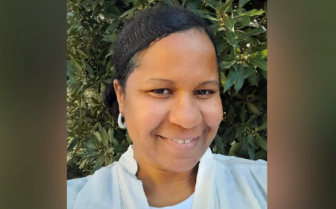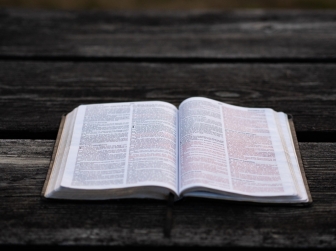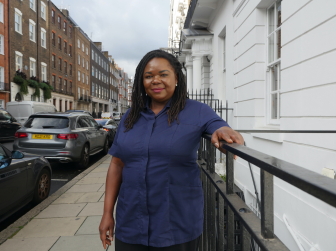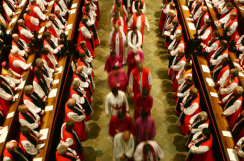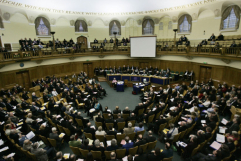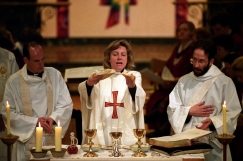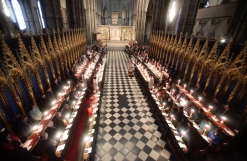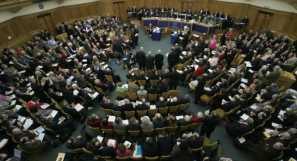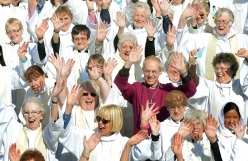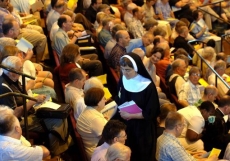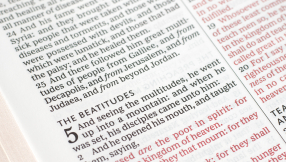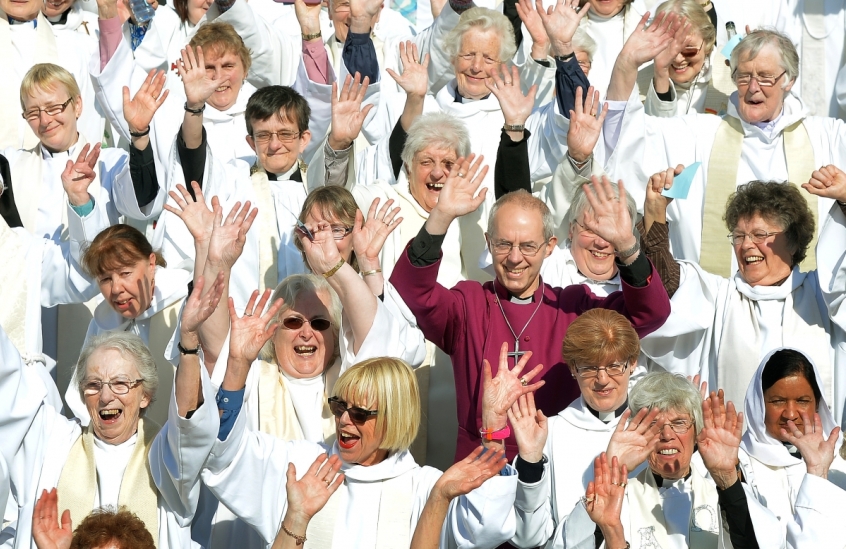
The Church of England overturned centuries of discrimination when it voted to consecrate women to the episcopate.
Cheers and whoops of joy erupted at General Synod, both inside and outside the chamber at York university, after an overwhelming majority of bishops and clergy voted in favour of ordaining women bishops.
Of the bishops, 37 voted in favour, two against and one abstained. Of the clergy, 162 voted in favour, 25 against and four abstained. The opposition was strongest in the House of Laity, responsible for defeating the measure by six votes in November 2012, where 45 voted against, 152 in favour and five abstained. A two-thirds majority was needed in each of the three houses of the synod.
One of the strongest addresses came towards the end of the five-hour debate. The Archbishop of Canterbury, Justin Welby, whose new style of leadership played a significant role in resolving the deadlock over women, said: "To pass this legislation is to commit ourselves to an adventure in faith and hope."
Its success, he said, would require "integrity and courage." Speeches given on the floor had been costly, painful and hopeful, yet it had not been culture versus theology, but genuine theological argument. "Reimagining and spiritual growth are inextricably entwined if we are to demonstrate the reality of Jesus and serve the common good," he said.
Crucial to it all was the independent process to hold everyone to account for the promises they make to each other. Advocating "the flourishing in the Church of all those who disagree," he added: "If I did not think that was likely, I could not support this legislation." Even if in the past the Church had been overwhelmed by the tortuous path it had taken, it must not be daunted by what lies ahead of it now. "You do not chuck out family even when you disagree."
Synod gave a standing ovation to the last speaker in the debate, John Spence, an ex-officio member of the House of Laity, and who is blind.
At one point, when passion got the better of reason, the Archbishop of York, Dr John Sentamu, had to call the synod to order. "This is not the House of Commons or Lords," he said. If members disagreed with someone, they should "keep it in their hearts".
Some used the Bible to advocate women bishops. Rev Jennifer Tomlinson, of Chelmsford, said: "If we say yes, our ministry will be even more biblical, as we show the world that in Christ, there is neither male nor female."
But mainly, Bible-based arguments came from the opposition.
Susannah Leafe, of Truro, said her experience of "facilitated talks" she had been told it was "ridiculous" to expect the concerns of conservative evangelicals into account because they were "wrong". The outcome was that the "majority" ended up telling the "minority" what was good for them. "We are going to need a change in culture. We are going to need a respect of conscience and conviction.... because there's a world out there that needs to hear the real gospel."
Judith Ayers of Exeter, a teacher, said the young women she taught had high ambitions, and it seemed "ludicrous" to them that they could aim for so much, yet could not aspire to be a bishop in the Church of England. It made the Church look "outdated and irrelevant". She accepted Christians were sometimes called to be counter-cultural. "But this should not be one of those occasions."
Even the Prime Minister, David Cameron, who was not at the Church of England's General Synod in York, urged members to approve women bishops. "I am in favour of women bishops," he said. "I think Archbishop Welby has shown great leadership on this issue and I wish him well."
The mood of the debate was set by a key intervention by a leading conservative evangelical early on in the debate.
Dr Philip Giddings, chairman of the House of Laity, said a better way had been found than November 2012, when the last package failed by six votes, but the package still did not meet the needs of everyone in the Church. He said: "The key for me is that this package is adequate."
This was because of the new House of Bishops' guidelines, which bishops and clergy will be disciplined if they fail to adhere to and which pledge proper oversight for those opposed to women bishops.
For many, he said, the new package still did not give the level of protection that evangelicals and Anglo-Catholics were asking for. But in a significant step, given the respect in which he is held by traditionalists and evangelicals, he said he would now vote for the legislation in spite of his reservations. He had been expected to vote against or abstain.
Before he retired Dr Giddings worked as a lecturer in politics and international relations and one of his areas of speciality was the work of the Parliamentary Ombudsman. As a member of the steering committee that drew up the new legislation, he was the primary influence behind the creation of the independent reviewer, an ombudsman-type role crucial in persuading opponents to abstain or vote in favour.
Another key intervention came from Adrian Vincent, of the Guildford diocese, an influential traditionalist, who confessed: "I shall be voting in favour today. By doing so I am betraying what I believe and I am betraying those who trusted in me."
Christina Rees, a long-standing campaigner for women's ordination, said: "The facilitated discussions here have made a genuine difference to us in this synod." They were initiated by Archbishop of Canterbury Justin Welby and run by Canon David Porter, his director of reconciliation. Mrs Rees said: "The speech that took me by surprise was Adrian Vincent. Adrian Vincent has made a sacrificial decision today for the sake of the Church. He has shown his loyalty as an Anglican, as a member of the Church of England and as a responsible member of this body." She was close to tears as she said: "He has made a sacrifice and I was not prepared for that. Thank you Adrian."
Canon David Banting, an evangelical, from the Chelmsford diocese, said the consecration of women "will create a new minority."
He added: "But we have committed ourselves to respect each other. To respect each other means to work hard to understand each other ." This was not to agree with each other. In his diocese, it meant being able to say publicly to his bishop that he thinks he is wrong.
Prudence Dailey, from the Oxford Diocese, who voted against in November 2012 said she would abstain this time. "I intend to abstain because I believe we have arrived at a solution which the majority of people in all parts of the Church can agree to live with, I have no desire to block that," she said.
"In November 2012 in the aftermath of the vote, it is hard for me to forget the bile, vitriol and disapprobation that was heaped on the heads of those, particularly those in the House of Laity, who defeated the measure. If I stick my head above the parapet I expect to have bricks thrown at me, I have never minded that.
"What I did mind was the implication that we were somehow, if we were grudgingly allowed these opinions, not allowed to express these through our votes."
Rod Thomas of Reform, who voted against, warned: "It's going to be hard work to accommodate each other."
Chik Kaw Tan, of the Lichfield diocese, said that the arguments being used for the consecration of women were the same as those used to "redefine marriage". Said clear scriptural teachings on the different roles of men and women meant he had to vote against the legislation.
Samuel Margrave of Coventry voted against. He had received and continued to receive "a great deal of grief" but he did not agree with people voting in favour for political reasons, or because they were worried about losing their seat on synod. "People are thinking far too much about re-election, or what other people will say when they go back to their dioceses."
Tom Sutcliffe, a liberal who had nonetheless voted against female bishops, said the new legislation was a huge improvement on the last and having voted against last time, he will back it this time.
But Jane Patterson, a conservative evangelical from Sheffield, told the synod she would continue to oppose the legislation. Her faction was being marginalised, she claimed; and opinion in the diocese of Sheffield was not 90 per cent in favour of women bishops, as it appears to be in the rest of the church.
The Bishop of Rochester, James Langstaff, admitted that because this was the Church of England, the nation, including parliament and media, was taking "a keen interest" in what the General Synod said and did, along with other churches and the wider Anglican Communion. "But, while we must be aware of those others, we are here today to do what we believe under God to be right."
He urged the synod to weigh "carefully" the consequences for morale and the Church's witness to the nation were the legislation to fail once again. The synod would be seen as "frustrating" the view of the wider church.
Elaine Storkey said what happened in 2012 might in the long term prove to be a good thing. "I believe God wanted greater unity in the Church, the greatest security for the minorities." Now there are 43 dioceses in favour, where before two opposed it. There was greater optimism, patience and hope, "a clearer sense of where we are going and how to take this forward."
Rev David Houlding, a leading Anglo-Catholic, said: "We have to learn to trust and go on trusting no matter how much it costs." There will be an ecumenical price to pay with the Church's Roman Catholic and Eastern Orthodox brothers and sisters, he warned, but the dialogue will continue. "We are proceeding without Catholic consent. Nonetheless we must not lose sight of the aspiration set before us in the great chorus of the Christian hymn, One church one faith, one Lord. To that end we must continue to work."
Michael Perham, the Bishop of Gloucester, said: "It is the whole church that has been disabled by the arguments strife and discord among us as we have struggled to resolve this issue... I want us all to flourish all contributing distinctively to the overall life of the Church." Evangelicals can stop falling out, Anglo-Catholics can recover a unity they have lost. "If we can let God make it, today can be a day when the Church flourishes afresh and those who have been divided can once again be friends."
Annette Cooper described how in 2012 she researched the well-being of women in Chelmsford diocese. "To put it bluntly we've hurt each other and today we can start to rectify this. We have not until recently found a way to do things differently." She added: "Today we are able to commit ourselves to mutual flourishing... to seek to create a Church where we can all reimagine and create new ways of working across our differences." "There is so much we can teach the world as we live out this commitment when we get home."
At the suggestion of the Archbishop of York, Dr John Sentamu, the synod members sang a spiritual worship song and prayed as they filed out for lunch, and then again after the final vote.
